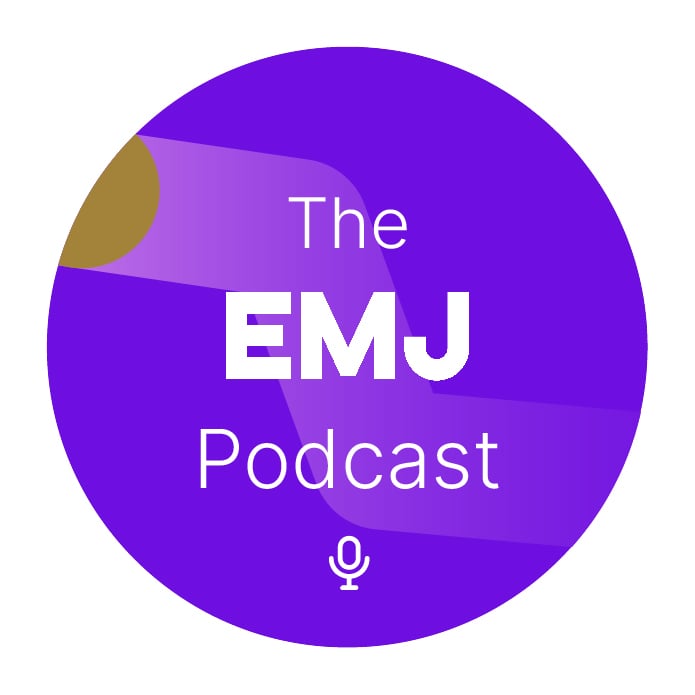The Burden of Osteoarthritis and why early-stage diagnosis represents a better chance of success for OA management
Podcast 1 out of 3
The EMJ Podcast | Bonus Episode
In this first podcast, Ali Mobasheri and Daniel White discuss why OA is a serious disease and how it’s burden of disease impacts individuals and society. Conversation focuses on the importance of early-stage diagnosis and why it is an important step in encouraging OA patients to live as disability free as possible. The experts also address how the initial stage of OA condition is often stigmatised, ignored, or downplayed by patients, whilst at the same time recognizing how early lifestyle modification can be an important step in better long-term disease management.
Spotify | Apple | Amazon Music | Download MP3 (mp3, 24:28 mins)
The Importance of Starting Well as a Patient with OA, and Living Well with the Disease in its Early to Middle Stages
Podcast 2 out of 3
The EMJ Podcast | Bonus Episode
In this second podcast, Ali Mobasheri and Daniel White discuss the importance of the patient actively engaging with OA post-diagnosis, and living well with the disease in its early to middle stages. The speakers also share their expert advice to help patients achieve the best possible quality of life. Additionally, practitioners are guided towards adopting a more proactive approach to OA. Emphasis is placed on the importance of multidisciplinary care, and the impact that patient self-empowerment and a positive mindset can have on managing chronic pain.
Spotify | Apple | Amazon Music | Download MP3 (mp3, 24:50 mins)
Considerations and Options on End-stage of OA Disease
Podcast 3 out of 3
The EMJ Podcast | Bonus Episode
In this third podcast, Ali Mobasheri and Daniel White focus on late-stage OA, when the burden is high for both the individual and society. Our two speakers advise patients, caregivers, and physicians about how OA disease should be managed in the end stages, when to engage patients for surgical options, and whether this is appropriate or not according to other comorbidities.
Spotify | Apple | Amazon Music | Download MP3 (mp3, 26:18 mins)
Ali Mobasheri
Professor of Musculoskeletal Biology, Research Unit of Health Sciences and Technology, Faculty of Medicine, University of Oulu, Finland
Prof Mobasheri is Chief Researcher and International Adviser in the State Research Institute Centre for Innovative Medicine (IMS) in Vilnius, Lithuania. He is the Immediate Past President of the Osteoarthritis Research Society International (OARSI) and serves on the Scientific Advisory Board of the European Society for Clinical and Economic Aspects of Osteoporosis, Osteoarthritis and Musculoskeletal Diseases (ESCEO). In addition, he serves as Collaborateur Scientifique de l’Université de Liège and Senior Strategic Advisor to the World Health Organization (WHO) Collaborating Center for Public Health Aspects of Musculoskeletal Health and Aging, Université de Liège, Belgium. He is a member of the International Cartilage Regeneration & Joint Preservation Society (ICRS) and serves on the translational science committee of ICRS.
Prof Mobasheri has held visiting professorships at Harvard University in Boston, Massachusetts, USA; University Medical Centre (UMC) Utrecht in the Netherlands; and King Abdulaziz University in Jeddah, Saudi Arabia. He is currently a Visiting Professor at Sun Yat-sen University, Guangzhou, China. His current research focuses on cartilage biology, specifically cellular metabolism, ion channel physiology, and biomarkers of osteoarthritis. He has published more than 300 scientific articles and review articles, and his current h-index on Scopus is 68. He is ranked as one of the top 10 leading experts in the world on osteoarthritis and cartilage on expertscape.com. Prof Mobasheri already leads a multidisciplinary team of researchers in Vilnius and is building a new team of researchers at the University of Oulu. His work is currently funded by the Academy of Finland, The Lithuanian Research Council, and several funding mechanisms of the European Commission (FP7, Horizon Europe, COST Action, EuroNanoMed, and Innovative Medicines Initiative).
Daniel Kenta White
Associate Professor, Department of Physical Therapy, University of Delaware, Newark, USA
Dr White received his Bachelor’s degree in health sciences, Master of Science degree in physical therapy, and Doctor of Science degree in rehabilitation sciences from Boston University, Massachusetts, USA. He completed a post-doctoral fellowship at the Boston University School of Public Health and earned a Master of Science degree in epidemiology from the Boston University School of Public Health in 2013.
Dr White is the Director of the Delaware Activity Lab, which is focused on the study of free-living behaviours in the home and community environment, and how these behaviours benefit health. The goal of the lab is to develop clinically feasible and practical ways to increase physical activity in older adults, people with arthritis, and people after total joint replacement.
Dr White’s research focuses on physical activity and physical functioning in older adults, people with knee osteoarthritis, and people after joint replacement. His research uses large existing datasets to answer questions related to physical functioning and physical activity. As well, he is also conducting clinical trials to lead ways to better promote and increase physical activity in people with knee osteoarthritis and after joint replacement.
Dr White is an Associate Editor for Arthritis Care & Research and an active member in the American Physical Therapy Association (APTA). His research is funded by the National Institutes of Health (NIH) and Rheumatology Research Foundation.
This content has been supported by Viatris








